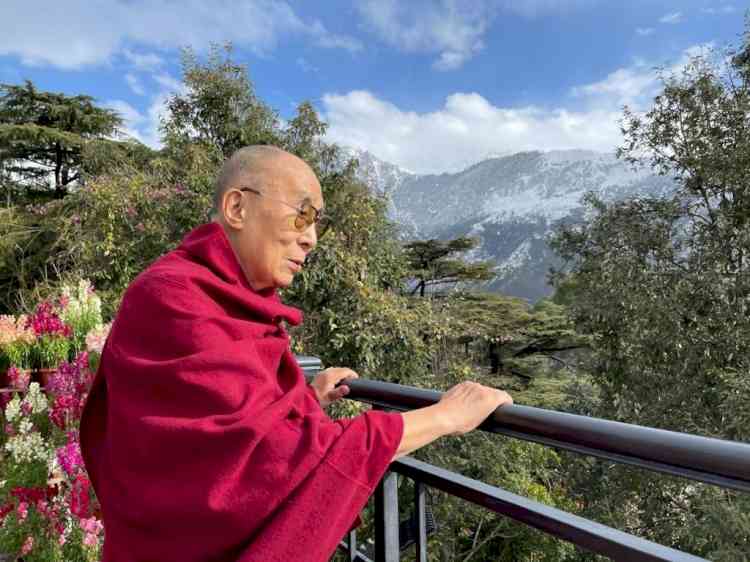Dalai Lama gazes long look homeward
Tibetan spiritual leader the Dalai Lama on Tuesday enjoyed the snow-capped Dhauladhar range on a bright sunny day from the balcony of his official residence in McLeodganj -- a small and quaint hill station on the suburbs of Dharamsala overlooking the Himalayas and Tibet.

By Vishal Gulati
Dharamsala, Jan 25 (IANS) Tibetan spiritual leader the Dalai Lama on Tuesday enjoyed the snow-capped Dhauladhar range on a bright sunny day from the balcony of his official residence in McLeodganj -- a small and quaint hill station on the suburbs of Dharamsala overlooking the Himalayas and Tibet.
The spiritual leader, known for his simplicity and jovial style, has been staying at home ever since the Covid-induced lockdown was first imposed in March 2020.
Officials at his private office told IANS that in his early years, the Dalai Lama used to regularly take hikes to Triund, a ridge below the Dhauladhar range and above McLeodganj hills. Enroute, he was occasionally seen interacting with the local Gaddi tribe.
His office shared photos of the spiritual leader relishing a brief respite in the form of bright sunshine after several days of rain and snow.
The Dalai Lama is the leading spiritual figure bringing Buddhist teachings to the international community.
Responding to the Dalai Lama gazing the long look homeward, Central Tibetan Administration (CTA) President Penpa Tsering said, "It is nice to see His Holiness enjoy the winter morning sunshine after a few days of snow and gloomy weather over the Dhauladhar range."
The photos were captured by Tenzin Jamphel, the official photographer.
The spiritual leader on Monday wrote on his Facebook page that he is now 86 years old, and at the age of 16, he took responsibility for Tibet at a difficult time and in so doing he lost his freedom.
"I am now 86 years old. At the age of 16 I took responsibility for Tibet at a difficult time, and in so doing I lost my freedom. At the age of 24 I lost my country and became a refugee. I have met all kinds of difficulties, but as the Tibetan saying goes: 'Wherever you are happy, you can call home, and whoever is kind to you is like your parents'.
"I lost my country, but I've been happy and at home in the world at large. Living a meaningful life is not about acquiring money and other facilities; it's about dedicating your life to helping others as much as you can," the spiritual leader said in the Facebook post.
The Dalai Lama, who along with many of his supporters fled the Himalayan homeland and took refuge in India when Chinese troops moved in and took control of Lhasa in 1959, believes in three commitments: The promotion of inner values as the source of real happiness, the fostering of inter-religious harmony, as exemplified in India, and the preservation of Tibet's language, culture and environment.
The Nobel Peace Laureate views himself as a simple Buddhist monk.
"I feel that is the real me. I feel that the Dalai Lama as a temporal ruler is a man-made institution. As long as the people accept the Dalai Lama, they will accept me. But being a monk is something which belongs to me. No one can change that. Deep down inside, I always consider myself a monk, even in my dreams. So naturally I feel myself as more of a religious person," the Dalai Lama had said.
He is optimistic that he will be able to return to Tibet.
"China is in the process of changing. If you compare China today to 10 or 20 years ago, there is tremendous change. China is no longer isolated. It is part of the world community. Global interdependence, especially in terms of economics and environment make it impossible for nations to remain isolated.
"Besides, I am not seeking separation from China. I am committed to my middle-way approach whereby Tibet remains within the People's Republic of China enjoying a high degree of self-rule or autonomy.
"I firmly believe that this is of mutual benefit both to the Tibetans as well as to the Chinese. We Tibetans will be able to develop Tibet with China's assistance, while at the same time preserving our own unique culture, including spirituality, and our delicate environment.
"By amicably resolving the Tibetan issue, China will be able to contribute to her own unity and stability," the Dalai Lama wrote on his website.
(Vishal Gulati can be contacted at vishal.g@ians.in)


 IANS
IANS 










